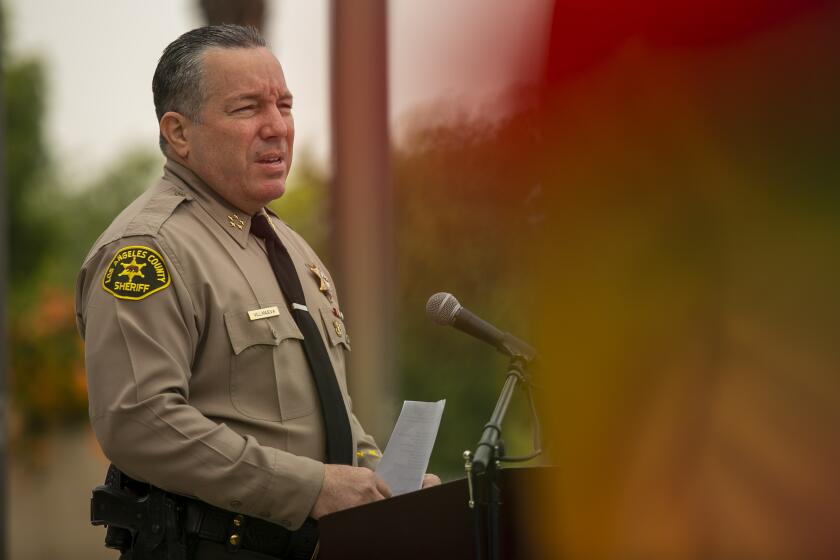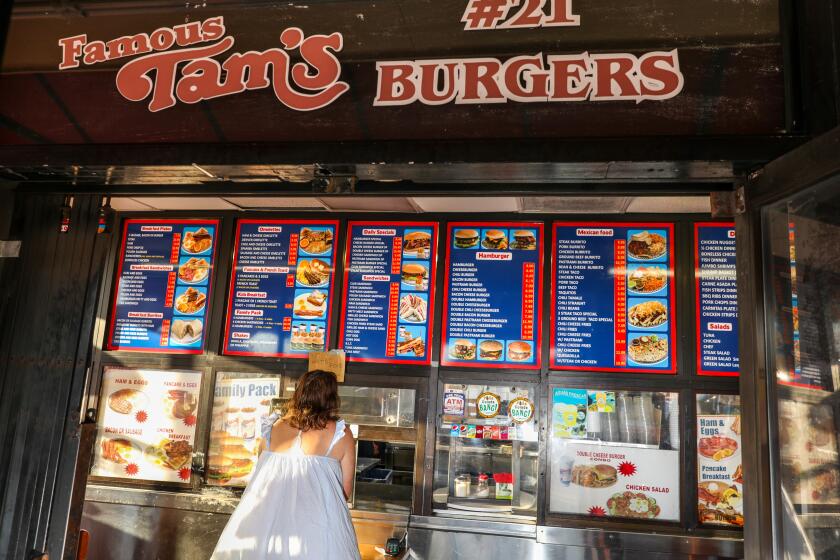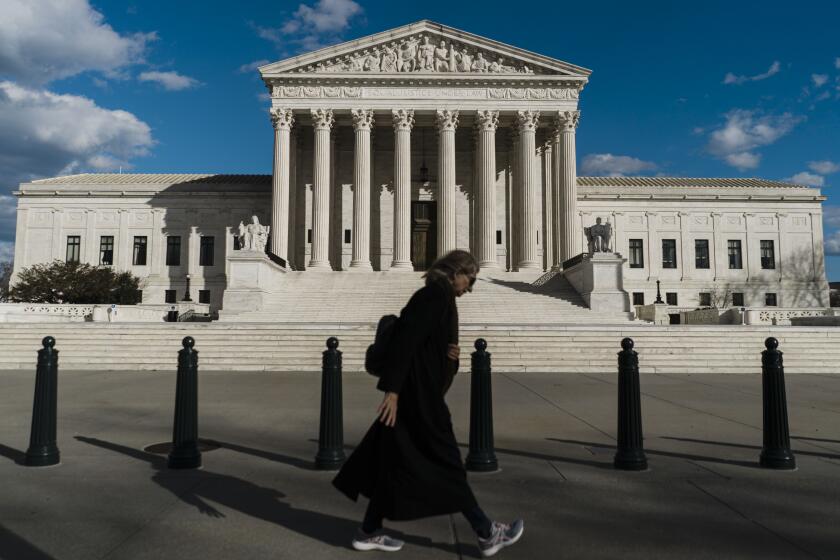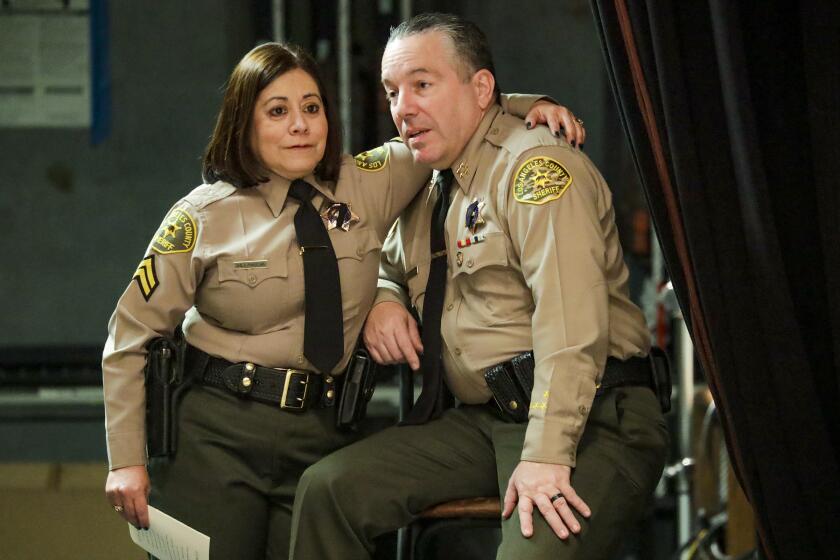Dozens of Sheriff Villanueva’s donors received permits to carry guns in public
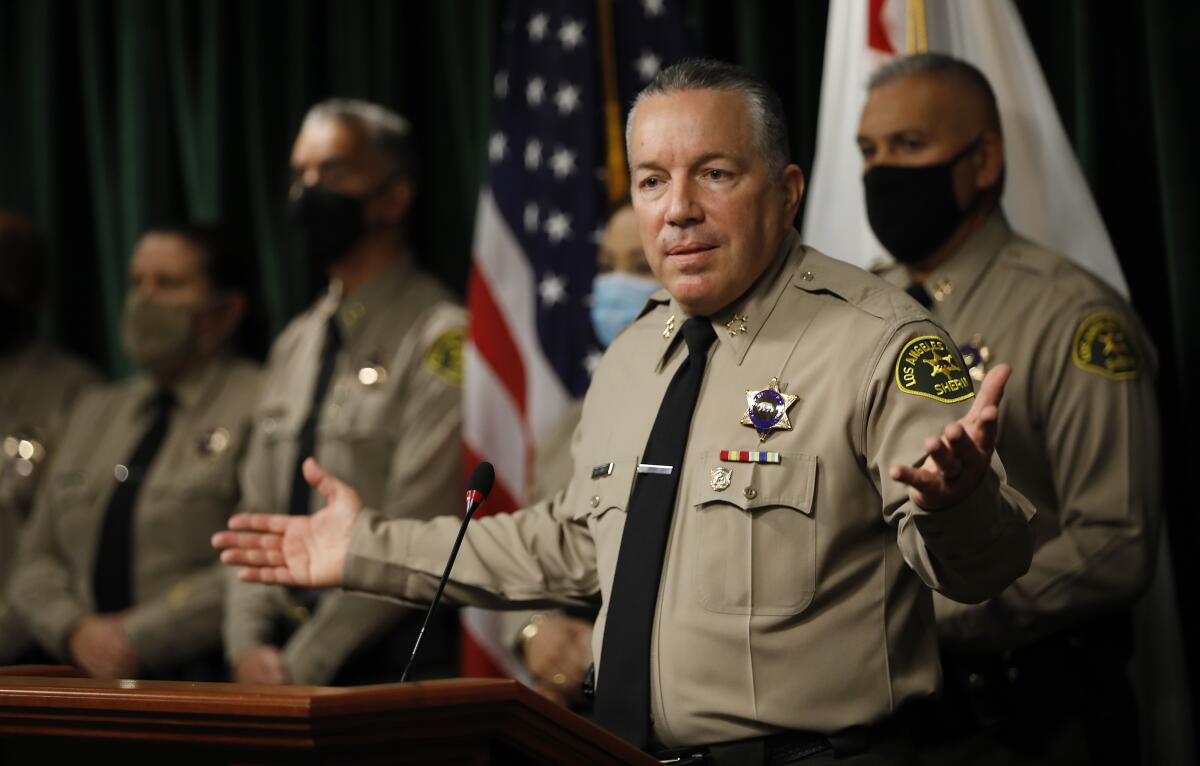
- Share via
There are few things Los Angeles County Sheriff Alex Villanueva has boasted about more during his first term in office than his success in dramatically increasing the number of people who are permitted to carry guns in public.
But Villanueva’s decision to supercharge the issuing of weapons permits has brought problems.
A Times investigation found that among the thousands of people who have received permits under Villanueva are dozens of donors to his election campaigns and others with special links to the sheriff. These people often gave questionable reasons for needing to be armed, received their permits more quickly than the average wait or were assisted by two deputies who worked directly for Villanueva.
And now those deputies, along with others with ties to the sheriff, have come under suspicion of wrongdoing that stems from the frenzied atmosphere Villanueva created around the permits, which are called licenses to carry concealed weapons or CCWs.
Earlier this month, the Sheriff’s Department announced it was conducting a criminal investigation into “irregularities discovered in the CCW application process” that it described as a “possible long-term scheme to defraud” county residents and “weapon law violations.”
While the department said in a statement that Villanueva was “disappointed at the alleged conduct this investigation uncovered,” the owner of a gun shop that was raided as part of the investigation recently held a fundraiser for the sheriff’s reelection campaign, which Villanueva attended. It was one of several events at which Villanueva has appeared with people now under investigation.
A campaign spokesperson said Villanueva did not know the gun shop owner was under investigation when he attended the fundraiser last month.
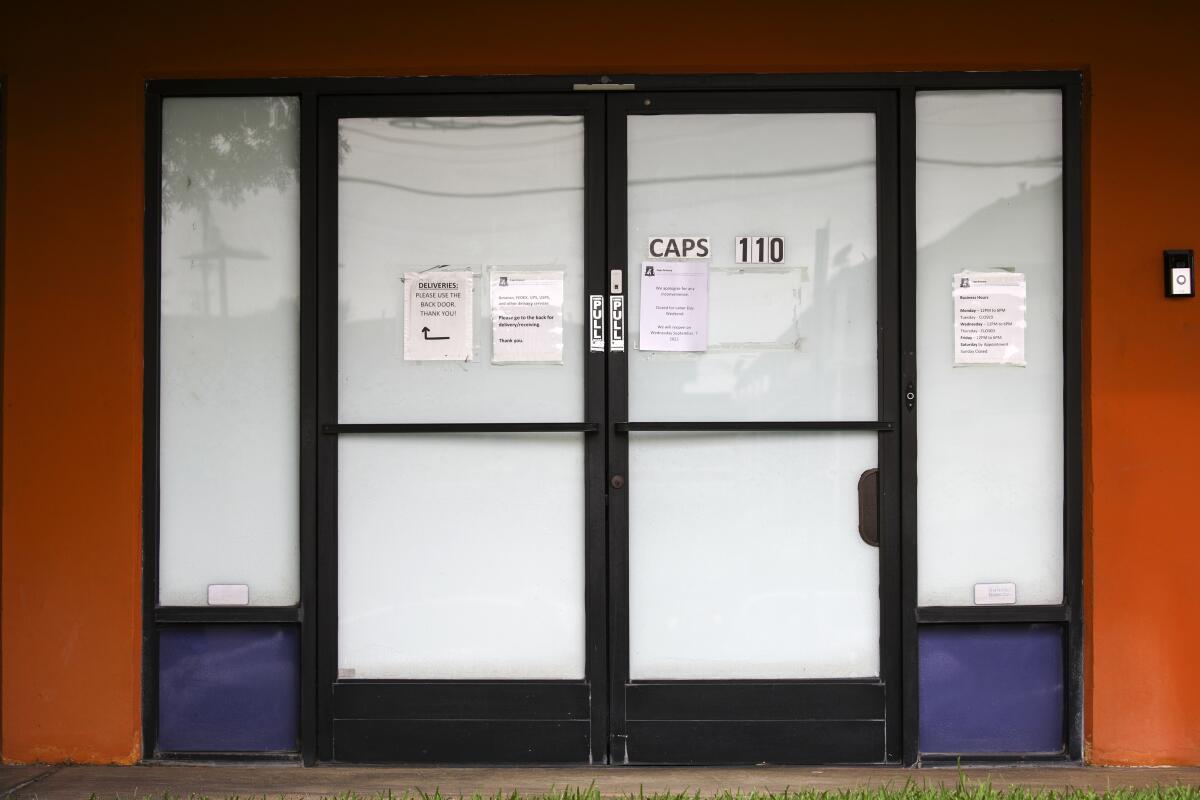
For this article, The Times analyzed gun permit applications submitted before the U.S. Supreme Court rewrote the rules regarding permits in June when it ruled that Americans do not need to have a reason for wanting to be armed in public. Because the Sheriff’s Department has refused to provide The Times with copies of every permit application, it was difficult to determine whether people connected to the sheriff were treated differently than others who applied.
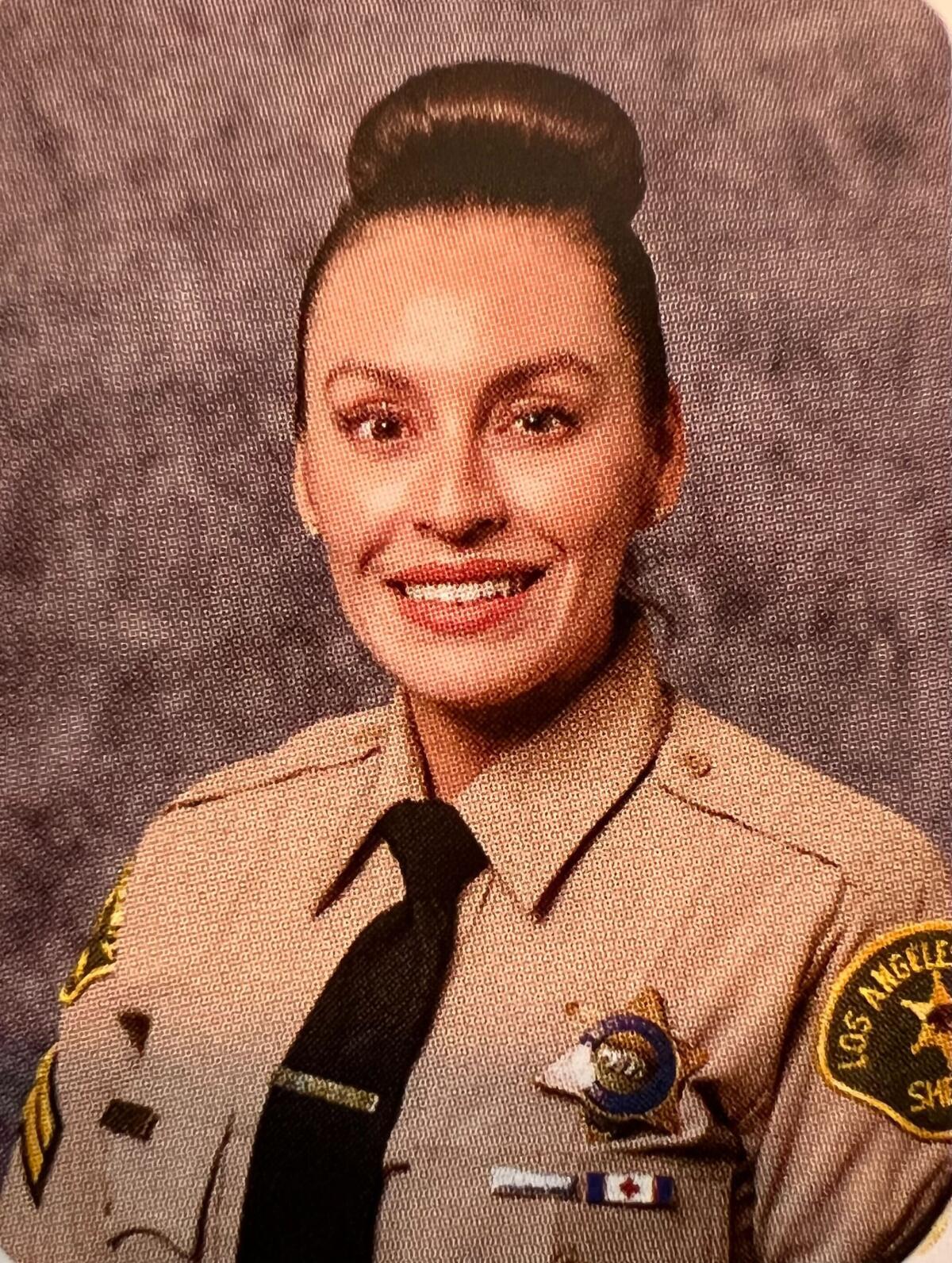
But the Times’ analysis of applications submitted by donors and others with links to Villanueva revealed red flags.
A donor who was assisted by Gisel Del Real, one of the deputies now under investigation, wrote on his permit application that he
needed to be armed because he and his boss “hike to remote areas like in the high mountains to meditate with nature where there is no law enforcement readily available.”
The donor, tax records show, worked for a religious figure who called himself the “Pope of Buddhism” and was wanted by Chinese authorities for fraud before he died earlier this year. The donor received his permit in a month, much more quickly than the six to eight months that Villanueva said in June was the typical wait. He could not be reached for comment.
Another permit holder, Alejandra Dominguez, is a friend of the sheriff’s wife who has posted photos on social media of the two walking the Villanuevas’ dog and, last year, of herself in Villanueva’s office, sitting at his desk, with the caption: “Because when you get the opportunity to sit on the Sheriff’s chair … you just take it!”
L.A. County Sheriff Alex Villanueva says he’s issuing more gun permits since the Supreme Court ruled applicants don’t have to explain why they want one.
On her permit application last year, Dominguez cited a climate of “hatred towards law enforcement officers” and claimed she was in danger because she was married to one. Two months after being granted her permit in October, Dominguez donated to Villanueva’s campaign and, earlier this year, helped host a fundraiser for him.
Reached by phone, Dominguez declined to comment.
“I’m not comfortable talking to you about any of this stuff,” she said.
Villanueva and a spokesperson for the Sheriff’s Department did not answer most of more than a dozen questions about how weapons permits are awarded and the treatment given to donors who applied for permits. The spokesperson said that campaign donations have “no bearing on the issuance” of a weapon permit.
“Over 3,400 people have donated to Sheriff Alex Villanueva’s reelection campaign, and it stands to reason some may have also applied for a CCW,” Lt. Oscar Martinez wrote in an email late last month.
With some of the toughest gun laws in the nation, California has long required gun owners to have “good cause” to carry weapons in public. To clear that bar, permit applicants had to convince their local police department or county sheriff’s department that there was a credible threat to their safety or they had some other legitimate reason.
Past L.A. County sheriffs took a hard-line approach to applications.
“We just didn’t want guns all over the county,” said Larry Waldie Sr., who served as former Sheriff Lee Baca’s second in command for several years until he retired in 2011. “We didn’t feel there was a great need for” it.
Permits, which are typically valid for two years, were almost automatically granted to judges, prosecutors and retired federal agents, while others had to show they were facing a serious threat — backed up by a police report — and that they had a clean criminal record, Waldie said.
The Sheriff’s Department gave out just 20 permits in 2015, 32 the following year and 76 in 2017, according to figures provided by the department.
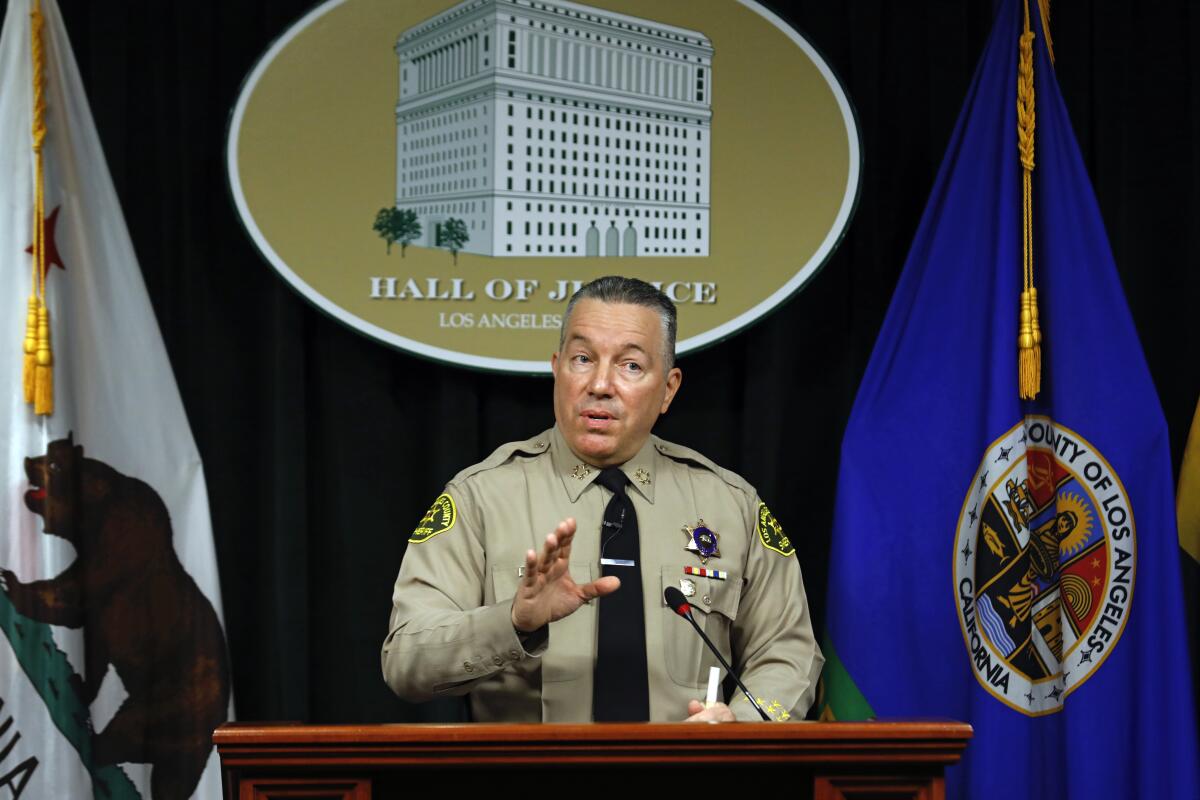
Villanueva blew up the status quo by making it easier for people to qualify for permits. The lower standard, he said, was necessary in light of a rise in crime and a push from the left to cut law enforcement budgets in favor of more social services.
In 2020, Villanueva said he would increase by five times the number of people permitted to arm themselves in public. At that time, just 155 people in the county of 10 million had CCW permits issued by the department. By late May, that number had swelled to more than 2,800 — an eighteenfold increase.
“If you’re working as a real estate agent, female real estate agent, you’re showing houses, you know, by yourself — for me that’s good enough,” Villanueva said at a town hall event last year, when he advised attendees on how to successfully apply for permits. “Same thing if you’re in a business, you have cash receipts, you do deposits at the bank. That’s good enough as well. All we’re asking for is a reasonable explanation on the good cause.”
The Times’ analysis found that at least 50 people who received permits contributed either to Villanueva’s first campaign for sheriff or his current bid for reelection, and more than half gave the money before being granted a permit. About a dozen donated well after they received a permit.
Some of those donors had previously been denied a permit by another law enforcement agency. The Times reviewed copies of donors’ applications and interviewed some of them. Those reached for comment said their permit applications had no influence on their decision to donate. Others declined to comment or could not be reached.
The Sheriff’s Department received one businessman’s application, and two days later he contributed $1,500 to Villanueva’s reelection campaign. The man later received a permit. After receiving a call from The Times in March about the donation, he made a contribution to another sheriff candidate.
A handful of donors noted on their applications that they had been arrested or convicted of crimes. And, although that can disqualify a person from being eligible for a concealed carry permit, the Sheriff’s Department granted them. Sheriff’s officials redacted these donors’ applications to withhold information about their arrests or convictions.
The Times found only one donor to Villanueva whose application for a gun permit was denied. Three other donors were initially rejected, but later received permits.

Villanueva said in June it was generally taking six to eight months for an application to be processed and a permit to be issued.
The wait for Pascal Mouawad, a jeweler with a celebrity clientele, was far shorter.
About two months after applying for a permit, Mouawad donated $1,500 to Villanueva’s reelection campaign in April 2021, and a week later he received his permit. He donated another $1,500 two months after that.
On his application, Mouawad noted that he had been turned down for a permit by the Los Angeles Police Department in 2020 because it determined he did not meet the good cause requirement. He wrote on his application to the Sheriff’s Department that he needed to carry a weapon because he transports valuable jewelry to his ultra-wealthy clients, and armored car companies wouldn’t drive to private residences.
Los Angeles County prosecutors have declined to file charges against donors to Sheriff Alex Villanueva’s 2018 campaign, saying there was insufficient evidence to prove that contributions were funneled through one person.
In June 2021, Mouawad posted a photo of himself with Villanueva to his 1 million Instagram followers. In the caption, he railed against efforts to “defund” the police: “We need law enforcement and must support the leaders of these organizations,” he wrote. “Sheriff Villanueva is one of these distinguished leaders who has done a lot for the Sheriff’s Department since he got elected.”
In another social media post a few days later, he announced that he was a member of the sheriff’s Community Advisory Council, which he said provides “advisory services to the Sheriff Department to strengthen its relationship with the business community it serves.” Mouawad also was a host for a Villanueva fundraiser at the high-end restaurant Avra in Beverly Hills in December 2021.
Mouawad donated to previous sheriffs’ campaigns as well, giving $500 to Jim McDonnell in 2018 and $1,500 to Baca in 2013, but it was unclear from his 2021 application whether he had sought permits from them.
Mouawad did not respond to several requests for comment.
Cerritos City Councilman Naresh Solanki said he doesn’t know the sheriff personally but was invited to a fundraising event and wrote a $1,000 check to Villanueva’s campaign in May of last year.
Solanki said there is no connection between his donation and his license, which he applied for in July of last year and received in December. His application said his recycling business requires him to carry money and he told The Times he was robbed at gunpoint more than 10 years ago while depositing money at a bank.
“It’s for safety and security in case somebody tries to stop me and says, ‘Give me the bag,’” he said.
On the sheriff’s campaign website, Villanueva touts Solanki on his list of endorsers.
The process for reviewing applications and deciding who needs a permit should be an impartial one, untouched by special interests or personal connections, said Jennifer Rodgers, a former federal prosecutor and lecturer at Columbia Law School who has studied public corruption and devised efforts to combat it.
“It’s certainly fair to say that public servants who appear to favor people they know — friends of theirs, friends of their wives and campaign donors — is not the way you want your public servants to behave,” Rodgers said.
The Sheriff’s Department denied a request for copies of all gun permit applications submitted under Villanueva, claiming that producing them would be unduly burdensome. The Times made subsequent requests this year for permit applications submitted by campaign contributors, others with known ties to the sheriff and people with the same last names as donors. The department provided more than half of those requested records. In a letter sent this week, sheriff’s officials declined to release copies of the remaining applications, saying they are now part of the ongoing criminal investigation.
To identify donors who received permits, The Times compared campaign contribution records the sheriff has filed since 2017 to lists provided by the Sheriff’s Department of people granted concealed weapons permits through January of this year. The Sheriff’s Department has not yet provided the names of the rest of the people who received permits this year.
The spike in permits has been a major point of pride for Villanueva, who regularly uses social media broadcasts to update the public with the latest figures.
“Right now we’ve issued more CCWs than the rest of the sheriffs in the entire history of the department,” he said in January. “So we’re in a good place.”
Villanueva was not alone in his approach. The sheriffs of Riverside and Orange counties have taken a similarly permissive approach, together issuing more than 32,000 active permits, according to figures provided by their departments.
Following a decision by the U.S. Supreme Court in June, the rest of the state will have no choice but to follow suit.
High court strikes down gun laws in California, New York and six other states that restrict permits to carry a concealed weapon.
The high court’s ruling found that New York’s “proper cause” restriction — akin to California’s good cause requirement — is unconstitutional because “it prevents law-abiding citizens with ordinary self-defense needs from exercising their right to keep and bear arms.”
Villanueva announced shortly after the Supreme Court ruling that county residents would no longer be required to give a reason when applying for permits. He speculated that 50,000 people in L.A. County could eventually receive permission to arm themselves in public.
But the ongoing criminal investigation has complicated things for the sheriff as department employees with connections to him are now under scrutiny.
Earlier this month, sheriff’s investigators served search warrants at Del Real’s house, at a Monterey Park gun shop whose owner has ties to Villanueva and at the home of a community organizer with ties to the department and the gun shop. Del Real and another deputy, Carrie Robles, were relieved of duty.
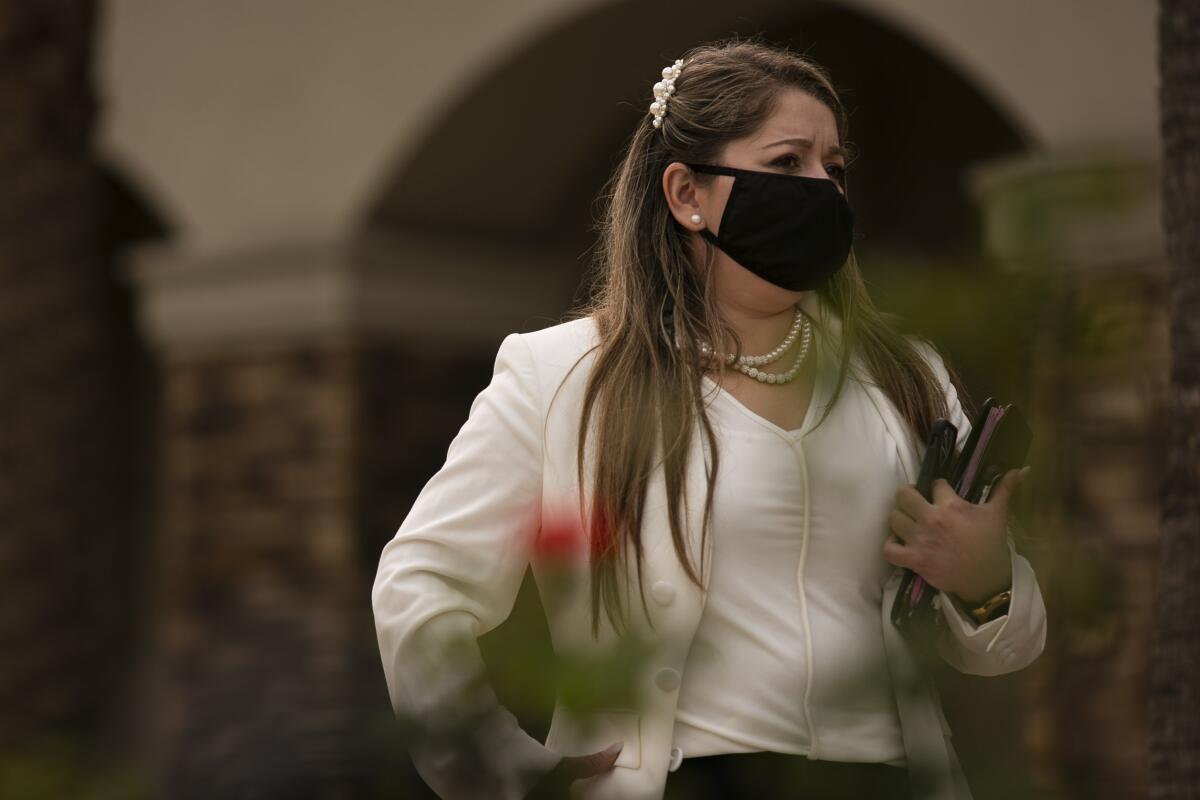
In its brief statement on the investigation, the department did not name any suspects or detail what schemes they may have carried out. The investigation, according to the statement, was opened a year ago.
The Times found that Del Real, who worked directly with the sheriff as a member of his executive projects team, signed her name as a “witness” on at least 10 donors’ applications, as well as those of a donor’s three relatives.
In a brief interview in June, Del Real said any deputy who accepts a CCW application can “witness it” and then send it to the CCW unit for processing. She declined to comment further about the circumstances under which she accepted applications from donors, referring questions to the Sheriff’s Department.
One of the donors Del Real assisted was Mimi Hua, who owns the Newport Tan Cang restaurant in Rowland Heights. Del Real signed Hua’s permit application on June 8, 2021, the same day a photo was posted on Instagram of Villanueva attending an event at the restaurant. The day before, Hua, who did not respond to requests for comment, contributed $1,500 to Villanueva’s campaign. She received her permit in December 2021.
In other photos of the same event posted online by Caps Armory, the gun shop raided earlier this month by sheriff’s investigators, Villanueva was sitting with the gun shop’s owner, Roy Yamamoto, as well as Del Real, Robles and Villanueva’s wife. Caps Armory also donated $1,000 to Villanueva around the time of the restaurant event.
Approached at his gun shop Friday, Yamamoto declined to comment and told a Times reporter that only law enforcement officers were allowed in the store, even though the reporter was buzzed in through a locked door.
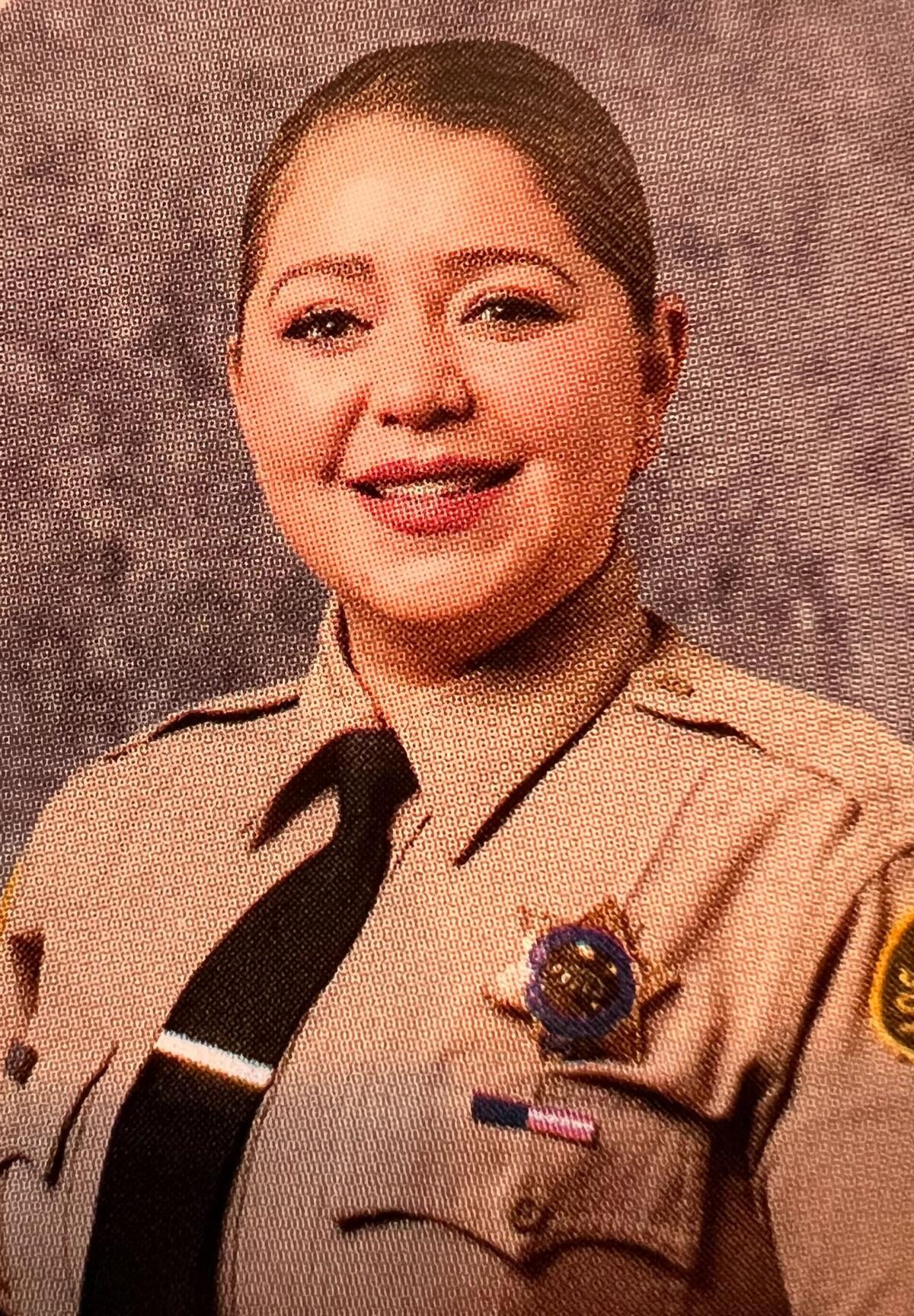
After two uniformed sheriff’s deputies who were shopping at the store left, Yamamoto said he would ask two other men in the store, who he said were officers, to cite the reporter for trespassing if he didn’t leave immediately.
Robles, who worked with Del Real on the sheriff’s executive team, signed at least one donor’s application. Robles had the sheriff’s wife, a retired deputy, as a training instructor in 2017 and has called her “Mom” on social media. As a trainee that year, Robles crashed her patrol car while on duty in Boyle Heights, killing two brothers, ages 7 and 9, and severely injuring their mother. The incident cost the county more than $22 million in legal payouts.
The sheriff’s wife, a former deputy, has carved out an influential role within her husband’s inner circle, officials in the department said.
Amy Johnson, an attorney representing Robles, said in an email that Robles “has no comment on the pending criminal investigation, however we look forward to all the facts and evidence coming to light which will prove her innocence.”
Investigators also served a search warrant on Sharis Rhodes, who describes herself online as an “entrepreneur, political facilitator and community organizer.” Rhodes, photos and videos posted online show, has been involved in connecting the sheriff with Black hip-hop artists to discuss policing and community issues.
Asked what role Rhodes had in the gun permit process, her attorney Ludlow B. Creary II said Rhodes “made no guarantees to anyone and that’s the only comment we’ll make.”
Sgt. Nikolai Vavakin, who was transferred to the permit unit in January as a supervisor, said some people have mentioned their donations to the sheriff when they call to ask about the status of their application, Vavakin said. He has responded by telling them their place in the queue.
“Obviously, they weren’t happy,” he said. “But most people were very polite.”
Vavakin, who said he did not know why people would believe a donation would fast-track their permitting process, said no one has received preferential treatment during his time in the unit. To the contrary, he said, he has denied permits to some of Villanueva’s donors because they were dishonest on their applications.
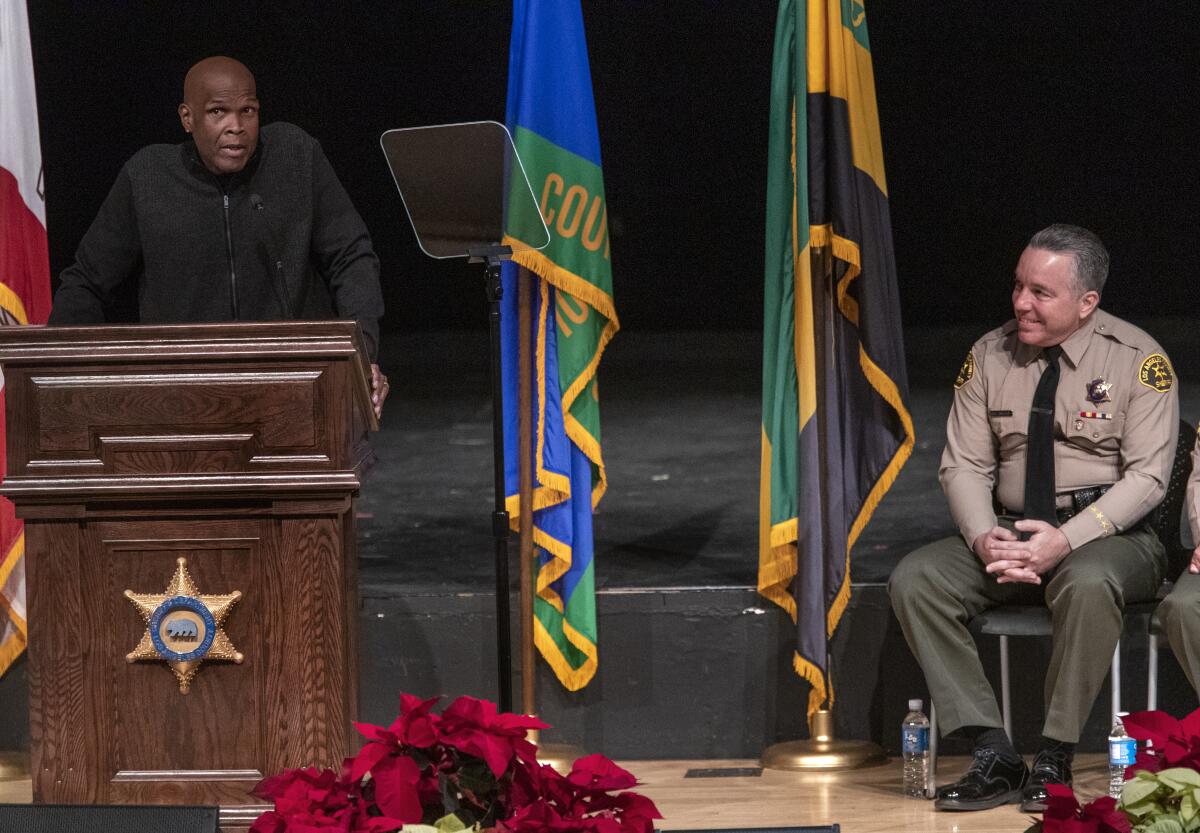
Radio personality Big Boy, whose real name is Kurt Alexander, turned in an early renewal application that Del Real signed in June 2021 after he first received a permit in July 2020. On the day Del Real signed his renewal application, Caps Armory posted a photo on its Instagram page of Alexander posing with a dog that is the store’s mascot.
“Did we end up in big boy’s neighborhood?” the shop wrote.
While Alexander did not contribute to Villanueva’s campaign, he endorsed him in 2018 before he beat McDonnell in an upset, according to the L.A. Sentinel. The radio host also emceed the sheriff’s swearing-in ceremony after he was elected and has since interviewed him on his show multiple times.
The Sheriff’s Department at first refused to provide a copy of Alexander’s permit application and a two-page letter Alexander wrote to Villanueva explaining why he needed to carry a gun.
When pressed, the department eventually relented, releasing Alexander’s application and later the letter with some redactions. In the letter, Alexander described several instances where he received death threats or had dangerous run-ins with members of the public.
In his application, Alexander said he had been convicted of a criminal offense, though details about it were redacted. Court records show that he pleaded no contest in 1996 to misdemeanor counts of carrying a concealed gun and theft and was sentenced to two years’ summary probation.
Alexander could not be reached for comment. His employer, IHeart Media, did not respond to a request for comment. Shortly after The Times sent questions to the company last month, a recent interview Alexander did with Villanueva was removed from the show’s YouTube page.
Vavakin, the sergeant in the permit unit, said a criminal history doesn’t necessarily result in an application being denied. Someone with recent arrests probably wouldn’t get a permit, but it wouldn’t be a deal breaker for others who are upfront and honest about old incidents, he said.
“We look at the totality of everything,” Vavakin said.
More to Read
Sign up for Essential California
The most important California stories and recommendations in your inbox every morning.
You may occasionally receive promotional content from the Los Angeles Times.
